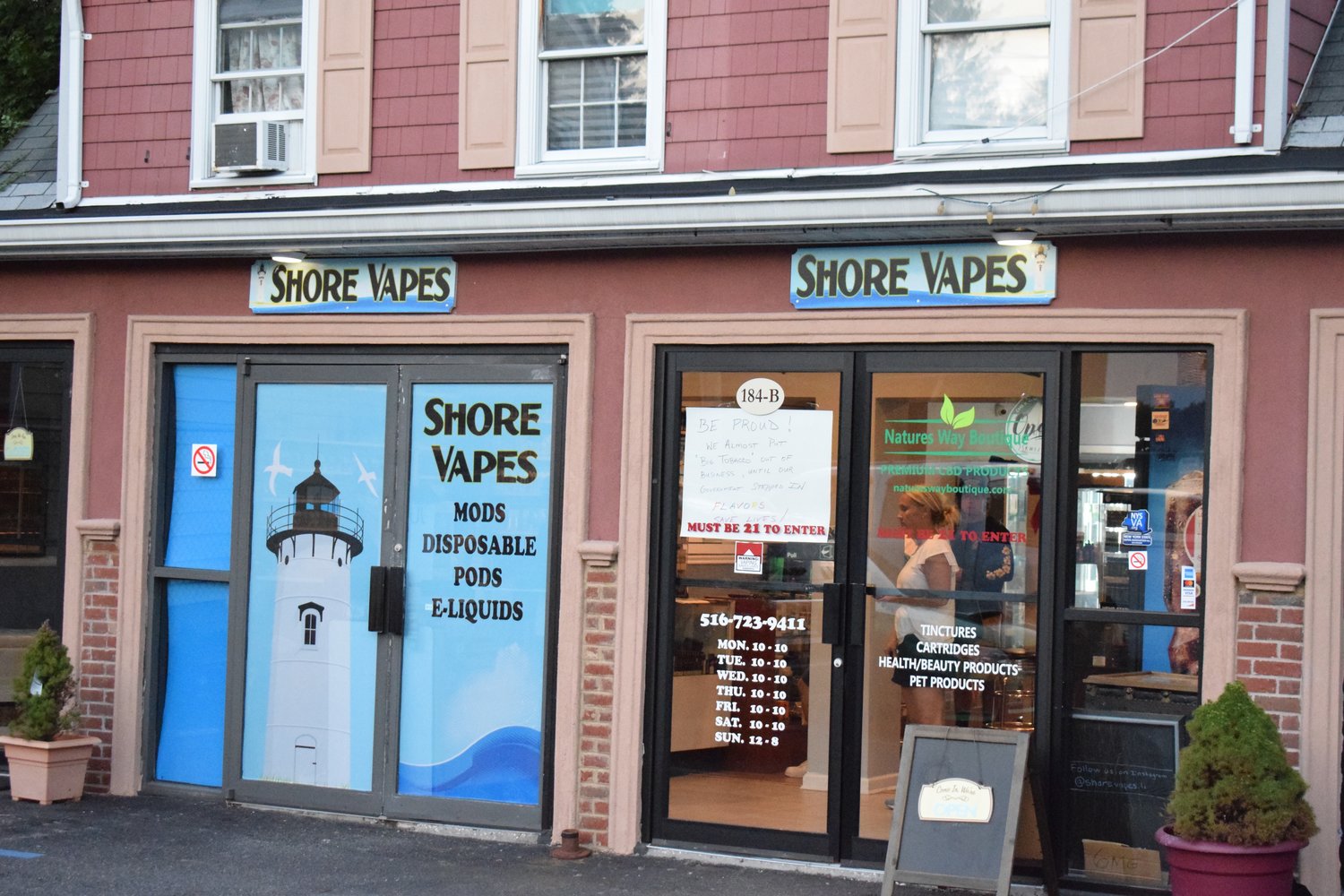Residents, civic groups react to vaping restrictions
With concern growing about lung disease and other disorders caused by e-cigarettes and a surge in the number of children who use them, federal and state governments have urged the tightening of restrictions against vaping. Officials have suggested tripling federal taxes on e-cigarettes and their accessories, as well as banning flavored cartridges.
Sea Cliff’s Alison Camardella, president of the North Shore Coalition Against Substance Abuse, said that vaping prevention is among the most important actions the organization undertakes. While it is common knowledge that cigarettes pose health risks, hundreds of people, Camardella said, are being hospitalized with vaping-related illnesses, which are not yet fully understood.
“We’re at the tip of the iceberg, as far as I’m concerned, when learning about the risks of vaping,” she said.
What she does know, Camardella said, is that vaping is a growing threat among children and teens. The difficulty of detecting e-cigarette vapor, social media’s perception of vaping as “cool” and a lack of early education to make children aware of its health risks are just a few of the factors that have made it such a significant part of teen culture.
“It’s only natural for kids to want to try the latest things on the market,” Camardella said. “It’s our job as parents and members of the community to educate them as to why they shouldn’t.”
Flavoring e-cigarette cartridges, she said, attracts children. Things that taste like candy attracts kids, she said, not nicotine flavoring.
However, Tammy Mink, owner of Shore Vapes in Glen Cove, said that flavored cartridges have more of a positive impact than a negative one. Her business helps adults quit smoking cigarettes, she said, estimating that about 90 percent of her customers use flavors to do so, because tobacco flavoring only brings cigarettes back to mind. “They don’t want to be reminded of that last cigarette,” Mink said.
She said she understands that officials are trying to improve children’s health, and she supports going after businesses that have sold e-cigarettes to minors. But Mink expressed concern about a growing black market in e-cigarette cartridges that she believes will be significantly worse for people’s health than the commercially made brands. And, she said, many people would go back to smoking cigarettes if flavors were banned, and the nicotine high is ultimately what attract minors to vaping, not flavors.
“These laws are going to hurt more than they’re trying to help,” Mink said.
Nassau County has also begun restricting vaping and e-cigarettes. County Executive Laura Curran launched Operation Clear the Air on Sept. 26 to crack down on counterfeit vaping products. In the following days, there were 15 violations for counterfeit products issued to businesses on the South Shore and in Mineola.
County Legislator Delia DeRiggi-Whitton, of Glen Cove, said that the Legislature was also considering banning flavored e-cigarette and vaping products that seem to be targeted at teens and young adults. “When you put out a product like bubble-gum flavor,” DeRiggi-Whitton asked, “who do they think they’ll attract?” She added that the county needed to consider banning the smoking of these products in public parks, and keeping advertisements about them away from schools, much like cigarettes are regulated.
Legislator Joshua Lafazan, of Woodbury, agreed. Lafazan said he was particularly concerned about “popcorn lung,” a nickname for bronchiolitis obliterans, which damages the lungs. He said he planned to host an informational seminar on vaping for the North Shore communities on Oct. 15 at Syosset High School.
“I’ve spoken to pediatrician friends of mine who tell me that this addiction is real,” Lafazan said, “and are warning about popcorn lung.”
Glen Cove City School District Superintendent Maria Rianna said the district has emphasized the dangers of vaping to their students at every opportunity. The school had invited multiple speakers to keep students informed of the health issues surrounding vaping, including Stephen Dewey, a neuroscientist and research professor at New York University’s School of Medicine and a former addiction psychiatrist at Northwell Health. She said the presentations warned students about the hazards relating to the heating of a vape and e-cigarettes’ coil and the emitting of metal particles from the coil into their lungs.
“The safety and well-being of our students and staff is our top priority, and will continue to be so moving forward.” Rianna said.
Dr. Sharon Harris, executive director of Glen Cove’s Substance Abuse Free Environment Inc., said that vaping has become a top priority for the nonprofit organization, which provides alcohol and drug prevention services throughout the city. Harris said that SAFE was working with its partners in the city school district to better inform students about the dangers of vaping and to bolster peer-resistance skills so they can reject vaping and help their friends avoid it as well.
While schools and organizations like SAFE and CASA can help curb vaping among children and teens, Camardella said, effective prevention starts at home. Along with talking about the risks of vaping, parents can engage in role-playing with their children to teach them refusal skills. Most important, she said, parents need to keep communication open with their children so they will be comfortable discussing vaping.

 44.0°,
Mostly Cloudy
44.0°,
Mostly Cloudy 




